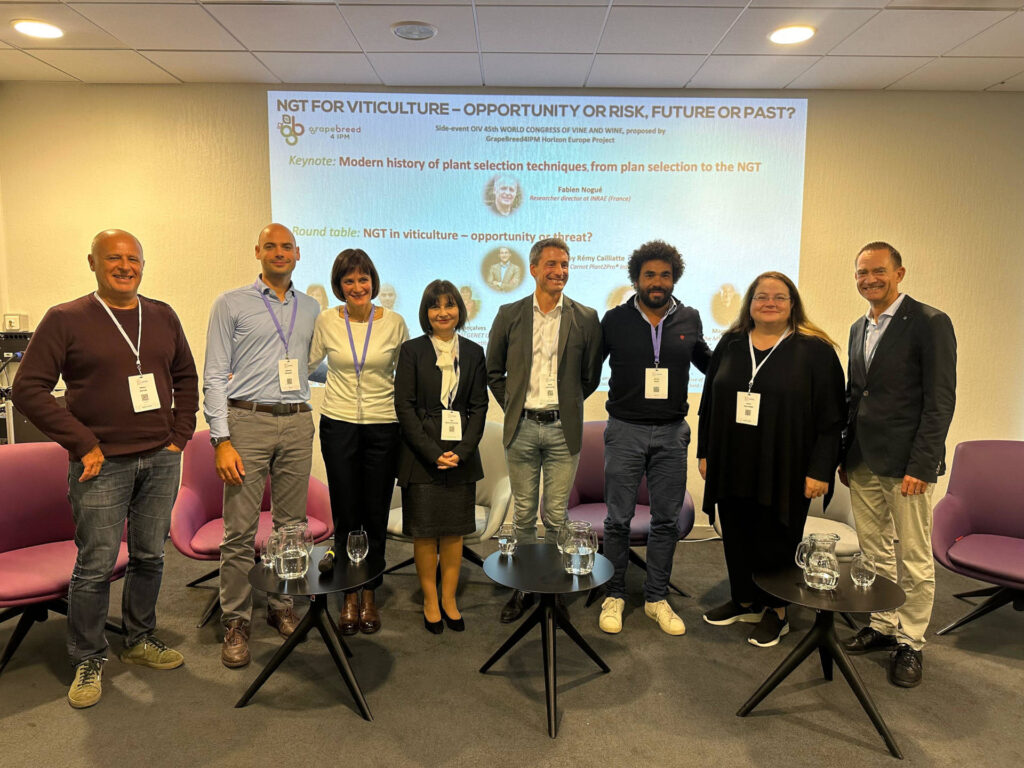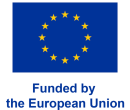The European project GrapeBreed4IPM has been present at the 45th World Congress of Vine and Wine held in Dijon, which aims to show the future of the wine industry in the face of current challenges.
Within the framework of this congress, GrapeBreed4IPM organized the round table “NGT for viticulture – opportunity or risk, future or past?” to address the importance and future prospects of New Genetic Editing Techniques applied to the wine industry.
Fabien Nogué, Research Director at INRAE (France), expert of the EFSA (European Food Safety Authority) Working Group on GMOs, opened the round table with a presentation on how, with human intervention, genetic biodiversity in viticulture has evolved, from the domestication and genetic selection that began in the Neolithic period to the new state-of-the-art gene editing techniques currently being used.
Lorenza Dalla Costa, Researcher at the Edmund Mach Foundation (FEM), stressed the importance of prior basic research to identify those genes involved in disease resistance, pointing out that this is a tedious and lengthy process that can take between 2 and 3 years. On the other hand, Umberto Salvagnin, also a researcher at the Edmund Mach Foundation (FEM), added that “perhaps the most complicated thing is to identify the gene responsible for the traits of interest, in this case focused on resistance to biotic stresses”.
On the other hand, Elsa Gonçalves, President of the GENET Group of the OIV and Professor of Quantitative Genetics at the Higher Institute of Agronomy, pointed out that “it is necessary to conserve the biodiversity and genetic variability initially created by nature through polyclonal selection as a strategic tool for the wine sector in the short, medium and long term, to face the challenges inherent to Climate Change”. Olivier Zekri, R&D Director at Novatech – Groupe Mercier, added “it is necessary that all the advances made on genetic improvement in viticulture are transferred to field trials to see their applicability, highlighting the long time that elapses until these varieties are tested in the field, up to 7 years”. He also indicated that “this type of innovation may entail economic risks, but it is necessary to assume them in order to collect data that will allow us to move forward”.
Considering the commercialization of these New Genetic Techniques (NGT), Cécile Collonnier, Technical Expert – R&D Community Plant Variety Office (CPVO), commented that “if there is an intention on the part of breeders to generate value from the varieties obtained after these NGT to commercialize them, it is of great importance to make an initial investment to protect them industrially and/or certify them as a first step before including them in the specifications of the appellations of origin”. To conclude this topic and the round table, Marc Dressler, Director of the MBA «Wine, Sustainability and Sales» and Professor of Business Administration at the University of Business and Society of Ludwigshafen / Weincampus determined that “to motivate consumers it is necessary to take into account their preferences and make the wine sector generate value for them, considering sustainability as a key topic to communicate and transfer knowledge related to NGTs”.
More about GrapeBreed4IPM
GrapeBreed4IPM “Development of sustainable solutions for viticulture through multi-actor innovation oriented to genetic improvement for integrated pest management” started in April 2024 and will last 4 years, ending in March 2028.
The National Institute for Agronomic, Food and Environmental Research (INRAE) is leading the project in collaboration with 18 international partners and 2 associated partners: Julius Kühn-Institut – German Federal Research Center for Cultivated Plants; Istituto di Genomica Applicata; Edmund Mach Foundation; French Institute of Vine and Wine; Fribourg State Institute of Viticulture; INRAE Transfert; Ludwigshafen University of Business and Society; Rauscedo Cooperative Nurseries; Horta; Ministry of Economy, Transport, Agriculture and Viticulture; Wine Technology Platform; National Interprofessional Committee for Wines with Designation of Origin and Geographical Indication; NEIKER; Mercier, pépiniériste viticole; Association of German Grapevine Plant Producers e. V.; Working Group for the promotion of fungus-resistant grape varieties; Moët Hennessy; Institute of Primeneutics of Polopriverdi; the Research Institute of Organic Agriculture and Foncalieu Vineyards.
For its implementation, GrapeBreed4IPM has a budget of €5.000.000 received from the European Union under the Horizon Europe funding program (grant number 101132223), plus €600,000 received by an associated partner from the Swiss government.
























